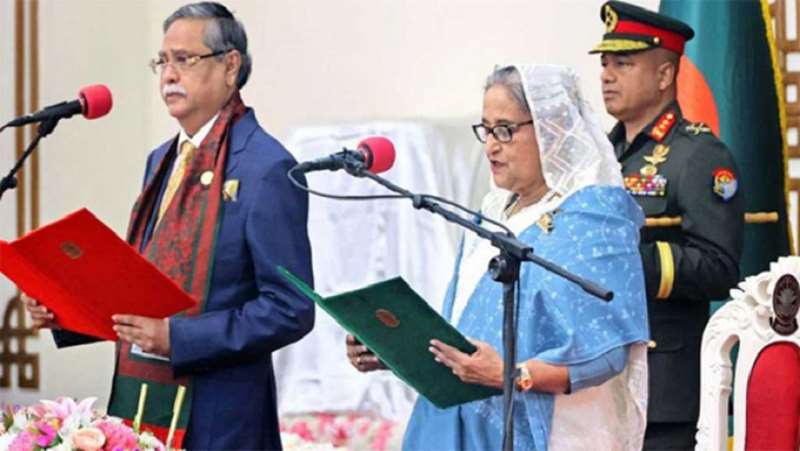A long-time female head of government
Sheikh Hasina made a world record

Honorable Prime Minister Sheikh Hasina
Sheikh Hasina, the daughter of Bangladesh's Father of the Nation, Bangabandhu Sheikh Mujibur Rahman, and leader of the Awami League, has carved a unique niche in global politics. She established this distinctive legacy by being sworn in as Prime Minister for an unprecedented fourth consecutive term, marking her fifth term overall. Sheikh Hasina's latest oath-taking ceremony as Prime Minister occurred at the Durbar Hall of Bangabhaban on a Thursday evening.
Before this, she served as Prime Minister from 1996 to 2001. Currently, she holds the record as the longest-serving female head of government in the world, having led for 20 years across four terms. Her most recent oath marks the commencement of her responsibilities for another five years.
Under Sheikh Hasina's formidable leadership, the Awami League has seen significant strength, earning the label of 'hard power' from Time magazine and being described as a 'one-woman show' by the BBC. Forbes, an American publication, ranked her 46th on their list of the world's 100 most influential women, a slight drop from her previous 42nd position in 2022.
Forbes’ latest list of influential women, released last month, features leaders from various sectors worldwide. Sheikh Hasina, who first became Prime Minister from 1996 to 2001, has completed 20 years in this pivotal role across four terms. This journey into her fifth term commenced yesterday. Reuters, in a recent report, highlighted her dual role in advocating for democracy both as part of the government and in opposition.
Bangabandhu Sheikh Mujibur Rahman, Bangladesh's founding father, and his family were tragically assassinated on August 15, 1975. Sheikh Hasina and her sister Sheikh Rehana miraculously survived as they were in Europe at the time. A graduate of Bengali literature from Dhaka University, Sheikh Hasina was politically active from her student days. After living in exile in Delhi following the 1975 massacre, she returned to Bangladesh in 1981 and was elected president of the Awami League that same year.
Sheikh Hasina first became a Member of Parliament in 1986 during the regime of military ruler Ershad and was subsequently elected in 1991, 1996, 2001, 2008, 2014, and 2018. She won her eighth parliamentary seat in the elections held on January 7.
The Awami League formed the government for the first time after winning the seventh National Parliament election on January 12, 1996, with Sheikh Hasina as Prime Minister. She then went on to be sworn in as Prime Minister for the fifth time after victories in the 2008, 2014, and 2018 elections, and again this year.
Sheikh Hasina has envisioned a developed, prosperous, and smart Bangladesh by 2041, a dream she articulated in the party manifesto before the elections. Now, she embarks on realizing this vision. In 2007, she faced a new challenge from the caretaker government backed by the military. Despite attempts to exclude her from politics through the 'minus two' formula, she persevered with resilience. Since then, she has continued her journey, navigating various challenges.
The economy was struck by the coronavirus pandemic in March 2020. As the global economy began to recover, the Russia-Ukraine conflict emerged, adversely affecting Bangladesh's economy, like others worldwide, leading to increased commodity prices and public hardship.
Amidst dwindling reserves and opposition movements, the United States and its allies appeared to align with the opposition. Despite these challenges, the Awami League secured an absolute majority in the 12th National Parliament election.
Sheikh Hasina, in this year's election manifesto, advocated a zero-tolerance policy against corruption, pledging action against money laundering and vowing to eradicate bribery and corruption at all societal levels.
Beyond anti-corruption measures, the Awami League's election manifesto also focused on economic progress, aiming to transform Bangladesh into a prosperous, advanced nation by 2041 and an upper-middle-income country by 2031. Following her election victory, she cautioned against foreign influences, emphasizing national progress.
The Loy Institute, a Sydney-based independent think tank, reported on long-serving global leaders, including Cambodia's former Prime Minister Hun Sen and others like Sultan Hassanal Bolkiah of Brunei, China's Xi Jinping, Russia's Vladimir Putin, and several African leaders.
Despite these comparisons, Sheikh Hasina stands out for her role in transforming Bangladesh into a model of development, garnering international attention and surprise.










পাঠকের মন্তব্য